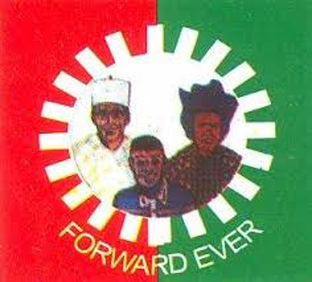The National Minimum Wage Bill (2019) on Thursday scaled
both first and second reading in the Senate after which it was committed to a
Special Adhoc Committee for further legislative work.
Deputy Senate President, Ike Ekweremadu, who presided over plenary, noted that
the Senate decided to give the National Minimum Wage Bill presented to it by
President Muhammadu Buhari on Thursday an accelerated hearing due to its
importance.
Ekweremadu added that this is the first time that the 8th Senate would suspend
its rules to take a First and Second Reading of an Executive Communication.
Senate Majority Whip, Senator Olusola Adeyeye (South West), was named the
Chairman of Special Ad-Hoc Committee while other members include Senator Abu
Ibrahim, the Chairman of the Senate Committee on Labour; Senator Shehu Sani
(representing the North West), Senator Sam Egwu (South East), Senator Suleiman
Adokwe (North Central), Senator Francis Alimikhena (South South); and Senator
Binta Masi Garba (North East).
Speaking on the Second Reading of the Bill, Ekweremadu said: “Let me
congratulate the Nigeria Labour Congress (NLC) and all those who have brought
this to this point. I would also like to thank my Distinguished Colleagues for
the speedy consideration of this Bill.
“This will be the first time the 8th Senate is reading an Executive
Communication and suspending our rules to take a First and Second Reading and
assigning the Bill to a Committee, all in one day. This shows how committed we
are to this issue.
“I believe what we have said so far will suffice in guiding the Committee. Just
to clarify: the new minimum wage brought to us is set at N27,000. There were
news reports of N27,000 for state workers and N30,000 for the Federal
Government workers, but this is a single national minimum wage of N27,000.
Another issue of concern is whether this affects organisations and
establishments employing less than 25 persons.
“If this does not affect these people, it means a whole number of people are
left outside the minimum wage and that is not right. In most countries, the
minimum wage applies to all workers, regardless of the number of people in an
establishment.
“I believe that at the public hearing, we will be able to clarify and sort it
all out. We must try our best to reduce the gap between the rich and the poor,”
the Deputy Senate President said.
The Committee was directed to report back to the Senate in Plenary within two
weeks.
Prior to the Second Reading of the Bill, Senators weighed in on the proposed
National Minimum wage.
“Let me congratulate the Federal Government, the 36 States of Nigeria and
stakeholders on this Bill for the increase in the minimum wage from N18,000 to
N27,000. Our Civil Servants will be excited about this. It may not be all they
hoped, but it is still an improved situation. Nigeria cannot develop without
the help of our Civil Servants,” Senate Majority Leader, Senator Ahmad Lawan
said.
“It is important that we lend our voice to see to the realization of this Bill.
Even though this may not be enough, productivity is sure to increase,” Senator
Shehu Sani stated.
“We will work hard, but it is important that this does not become another
election gimmick. Let the people who should get paid, actually get paid,” said
Senate Minority Leader, Senator Biodun Olujimi.
“This increase, to me, is just a little scratch,” said Senator Barnabas Gemade,
“I think the Federal Government should be able to pay N30,000 as opposed to
N27,000. Let us accelerate the passage of this Bill, it should not be delayed
any further.”
Minimum Wage Bill scales First, Second Reading in Senate
Follow Us On WhatsApp



